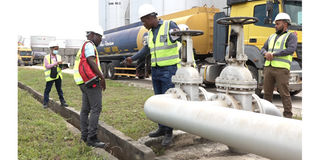Experts call for stronger workplace safety measures in Tanzania

What you need to know:
- Tanzania Occupational Health and Safety Association recently hosted a conference, bringing together industry experts, policymakers, and professionals from across Africa to discuss ways to enhance workplace safety
Dar es Salaam. Every day millions of Tanzanians wake up and head to work, whether in offices, factories, construction sites, or mines, to mention but a few.
While many focus on productivity and career growth, one crucial aspect often overlooked is workplace health and safety.
A safe work environment is not just about compliance with regulations—it is about fostering a culture where employees feel protected, valued, and empowered to thrive.
Recognising the significance of this issue, the Tanzania Occupational Health and Safety Association (TOHASA) recently hosted a conference, bringing together industry experts, policymakers, and professionals from across Africa to discuss ways to enhance workplace safety.
TOHASA President, Ms Caroline Baraza, said the conference's role is fostering collaboration among professionals across Africa.
"This global occupational health and safety conference brings together experts from Tanzania, Kenya, Uganda, Nigeria, and beyond. We have had engaging discussions on what needs to be done to enhance safety in workplaces," Ms Baraza said.
The Health and Environment Officer from the Ministry of Health, Ms Radhia Ismail, said that workplace safety should be a priority for all employers, as it directly affects employees' well-being and institutional development.
"We must ensure that our workplaces are safe. Employers and employees have a responsibility to adhere to workplace safety laws to prevent avoidable harm," she shared.
One of the most high-risk industries in Tanzania is mining, where accidents and health hazards are common.
Geita Gold Mine’s safety manager, Mr Isack Senya, said the mine has prioritized safety, reducing workplace incidents significantly over the years.
“In the early 2000s, we recorded many accidents, but over the years, we have made significant improvements to our safety systems. We now have policies ensuring employees do not work in unsafe conditions, and new hires undergo extensive safety training before starting their roles,” explained Mr Senya.
He further added that regular health assessments are conducted, especially for employees working in hazardous environments, such as those exposed to strong chemicals.
The World Health Organization (WHO) representative, Dr Ivan Ivanov, said it is important to adopt modern technology to improve workplace safety.
"The world is increasingly complex, and workplace safety requires highly competent solutions. Lack of occupational safety measures can have severe economic consequences," Dr Ivanov noted.
He added that investing in workplace health and well-being stimulates economic growth, estimating a global impact costing $30 trillion annually.
"We must leverage rapidly advancing technologies to ensure safer working environments," he said.
“We have brought our students here to learn about workplace health and safety developments,” said Muhimbili University of Health and Allied Sciences (Muhas) assistant lecturer, Ms Witness Axwesso.
“This conference provides them with a valuable opportunity to interact with professionals who are actively implementing safety measures in various workplaces,” added Ms Axwesso.
Ms Axwesso said the event fostered collaboration between stakeholders, ensuring that both private sector and industrial workers are well-informed about the need to protect themselves from occupational diseases and workplace hazards.
The conference provided a platform for stakeholders to discuss challenges and opportunities in occupational health, reinforcing the need for continued investment in workplace safety measures across all industries.





